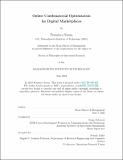Online Combinatorial Optimization for Digital Marketplaces
Author(s)
Susan, Fransisca
DownloadThesis PDF (3.773Mb)
Advisor
Golrezaei, Negin
Terms of use
Metadata
Show full item recordAbstract
Digital marketplaces have access to a large amount of user data, which presents new opportunities for learning and data-driven decision-making. However, there are two fundamental challenges associated with the use of data in digital marketplaces. First, many decision-making processes in digital marketplaces involve evaluating and experimenting with a large number of options. While companies may be comfortable with conducting A/B testing when there are only two options, this becomes impractical when there are many more options to consider. Second, machine learning models often rely heavily on data that may not always be accurate or reliable, leading to poor performance when making predictions and later on causing poor decision-making. In addition, real-time decision-making is often required.
This motivates the main theme in my thesis, which is to develop effective and efficient online algorithms that take advantage of structures and predictive information in time-varying combinatorial environments, facilitating decision-making in uncertain situations. Examples of such problems include assortment optimization, product ranking, and bid optimization for online advertising.
The thesis overall investigates online combinatorial optimization in digital marketplaces with various applications, covering general combinatorial problems, non-parametric choice models, constrained bid optimization in auctions, and fairness-constrained assortment optimization in four parts. In the first chapter, we address the problem of making real-time decisions in a time-varying combinatorial environment where the decision maker needs to balance optimizing their decision and learning about the underlying environment. We propose a unified framework that transforms robust greedy approximation algorithms into their online counterparts, even with non-linear objective functions. This framework is applicable in both full-information and bandit feedback settings, obtaining $\sqrt{T}$ and $T^{3/4}$ regret respectively. In the second chapter, we focus on the problem of learning non-parametric choice models on digital platforms in an active learning setting. This method involves influencing the data collection process to obtain more favorable data for estimation, in contrast to using only offline data or A/B testing, which might result in limited data sets.
In the third and fourth chapters, we incorporate constraints into our optimization problems, which add complexity to the decision space, while still maintaining a large decision space. Specifically, in the third chapter, we propose a bidding strategy for budget-constrained advertisers participating on multiple platforms with different non-IC auction formats. Our proposed non-linear value-pacing-based strategy is optimal in the offline setting and has no-regret in the online setting. Lastly, in the fourth chapter, we incorporate fairness constraints to an assortment optimization problem in digital marketplaces with diverse demographics. We aim to maximize the total market share across groups subject to the condition that the market share of each group meets a predetermined threshold, while also considering legal issues that prevent personalization. We present optimal approximation algorithms for both the offline and online settings.
Date issued
2023-06Department
Massachusetts Institute of Technology. Operations Research CenterPublisher
Massachusetts Institute of Technology